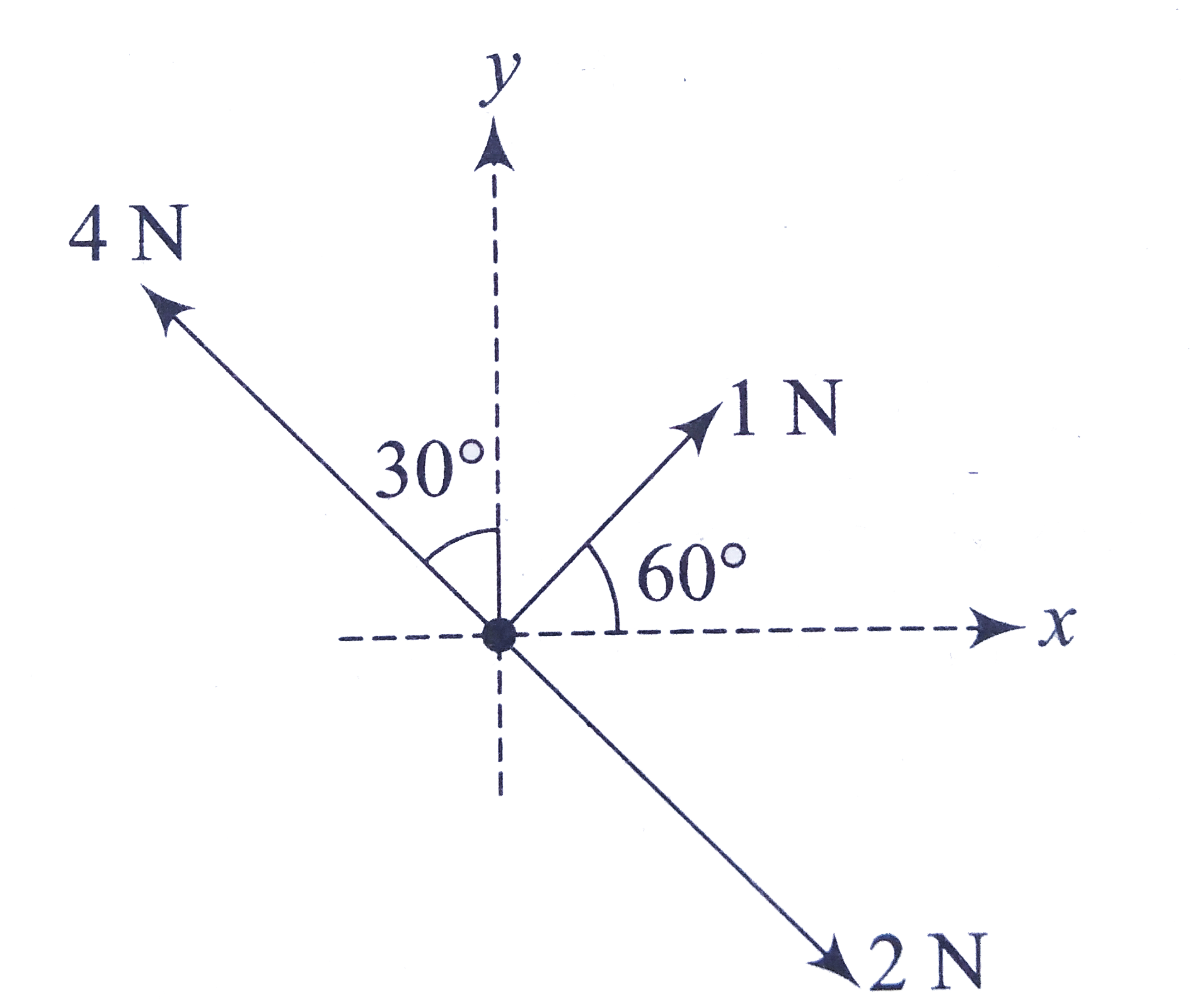If the resultant of forces of different magnitudes acting at a point is zero, then the minimum value of is
1
2
3
4
The correct Answer is:C
To solve the problem, we need to determine the minimum number of forces n that can act at a point such that their resultant is zero, given that the forces have different magnitudes.
1. Understanding the Problem: We need to find the minimum number of forces acting at a point such that their vector sum is zero. The forces must have different magnitudes.
2. Considering Two Forces: Let's first analyze the case when n=2. If we have two forces F1 and F2 acting at an angle to each other, for them to balance each other, they would need to be equal in magnitude and opposite in direction. However, since the problem states that the forces have different magnitudes, two forces cannot balance each other. Thus, n=2 is not sufficient.
- Hint: Think about how two forces can balance each other. What happens if they have different magnitudes?
3. Considering Three Forces: Now, let's analyze the case when n=3. We can arrange three forces F1, F2, and F3 such that they can form a closed triangle. For the forces to balance, the following conditions must hold:
- The horizontal components of the forces must sum to zero.
- The vertical components of the forces must also sum to zero.
This can be achieved if we position the forces appropriately. For example, if we have F1 acting horizontally, we can have F2 and F3 acting at angles such that their components balance F1 and each other.
- Hint: Consider how three vectors can be arranged to form a closed triangle. What conditions must be satisfied for them to balance?
4. Conclusion: Since n=2 is not sufficient, but n=3 can be arranged to balance each other, we conclude that the minimum value of n for which the resultant of the forces is zero is:
3
- The horizontal components of the forces must sum to zero.
- The vertical components of the forces must also sum to zero.
Topper's Solved these Questions
- CENGAGE PHYSICS DPPBook:CENGAGE PHYSICS ENGLISHChapter:CENGAGE PHYSICS DPPExercise:subjective type
Explore 51 Videos
- CENGAGE PHYSICS DPPBook:CENGAGE PHYSICS ENGLISHChapter:CENGAGE PHYSICS DPPExercise:Multiple correct Answer Type
Explore 54 Videos
- CAPACITOR AND CAPACITANCEBook:CENGAGE PHYSICS ENGLISHChapter:CAPACITOR AND CAPACITANCEExercise:Integer
Explore 5 Videos
- COULOMB LAW AND ELECTRIC FIELDBook:CENGAGE PHYSICS ENGLISHChapter:COULOMB LAW AND ELECTRIC FIELDExercise:Single Answer Correct Type
Explore 22 Videos
Similar Questions
Two perpendicular forces of magnitudes 10 N and 5 N act at a point. Find their resultant.
View SolutionTwo forces of 12N and 8N act upon a body. The resultant force on the body maximum value of
View SolutionThe sum of the magnitudes of two forces acting at a point is 18 and the magnitude of their resultant is 12. If the resultant is at 90∘ with the force of smaller magnitude, What are the magnitudes of forces?
View SolutionThe sum of the magnitudes of two forces acting at a point is 18 and the magnitude of their resultant is 12. If the resultant is at 90∘ with the force of smaller magnitude, What are the magnitudes of forces?
View SolutionMaximum and minimum values of the resultant of two forces acting at a point are 7 N and 3 N respectively . The smaller force will be equal to
View SolutionMaximum and minimum values of the resultant of two forces acting at a point are 7 N and 3N respectively. The smaller force will be equal to x N. Find x
View SolutionThe sum of the magnitudes of two forces acting at a point is 16 N. The resultant of these forces is perpendicular to the smaller force has a magnitude of 8 N. If the smaller force is magnitude x, then the value of x is (A) 2N (B) 4N (C) 6N (D) 7N
View SolutionIf the resultant torque of all the forces acting on a body is zero about a point is it necessary that it will be zero about any other point?
View SolutionThree forces acting on a body are shown in figure. To have the resultant force only along the y-directon, the magnitude of the minimum additional force needed si

View SolutionThree forces acting on a body are shown in figure. To have the resultant force only along the y-directon, the magnitude of the minimum additional force needed si

View Solution